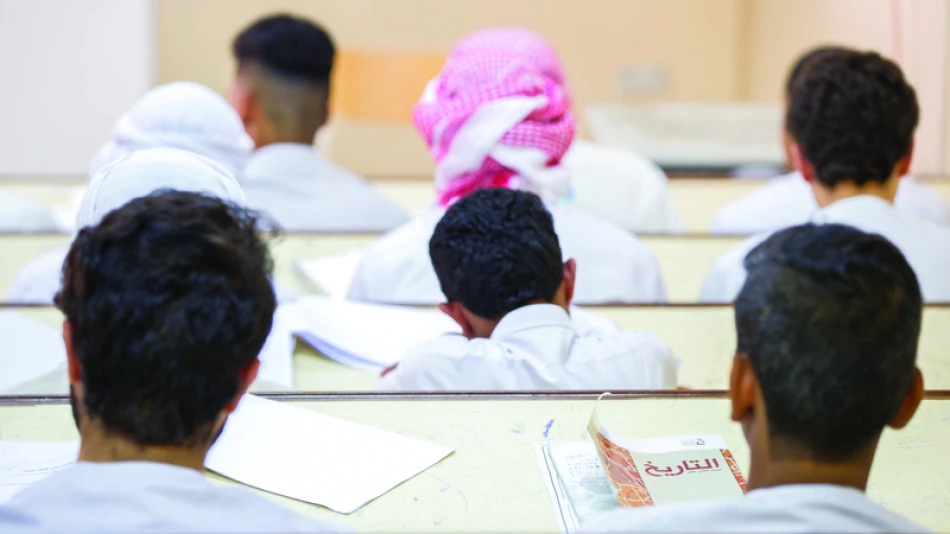
Nationwide Student Health Screening and Vaccination Program Launched in Public Schools
UAE Launches Comprehensive School Health Program: A Blueprint for Educational Wellness
The UAE Ministry of Education, in partnership with the Emirates Health Services Foundation, has rolled out an ambitious national school health screening and vaccination program across all government schools for the current academic year. This systematic approach to student healthcare represents a significant shift toward preventive medicine in educational settings, potentially setting a regional standard for integrated health and education policies.
Program Structure and Implementation
The program operates on two distinct levels of health monitoring. All students receive annual basic health screenings conducted by school nurses, including height and weight measurements, BMI calculations, vision tests, medical record reviews, and age-appropriate health education. This universal approach ensures no student falls through the healthcare cracks.
Targeted Comprehensive Screenings
More intensive examinations target specific grade levels—kindergarten, first grade, fifth grade, and ninth grade—conducted by integrated medical teams including general practitioners, dentists, nurses, and medical technicians. This strategic timing aligns with critical developmental phases when early intervention can have the greatest impact.
The screening protocols vary by age group, reflecting evidence-based approaches to pediatric health. First-graders undergo complete blood counts, hearing and vision tests, and ADHD assessments when necessary. Fifth-grade students receive spinal examinations for scoliosis detection, while ninth-graders undergo depression screening—acknowledging the mental health challenges of adolescence.
Emergency Medical Capabilities
School nurses are authorized to administer emergency medical interventions, including IV fluid administration and oxygen therapy. The program stocks essential medications including paracetamol, antihistamine creams, epinephrine for severe allergic reactions, and salbutamol inhalers for asthma management.
This medical empowerment of school staff represents a significant evolution from traditional educational roles, transforming schools into frontline healthcare delivery points—a model increasingly adopted in countries like Finland and Singapore.
Data Integration and Public Health Strategy
The program's data collection serves dual purposes: individual student care and population health surveillance. Health authorities will analyze screening results to identify disease patterns and support national health initiatives, while maintaining strict confidentiality protocols.
Vaccination Compliance Framework
The mandatory vaccination component, governed by Ministerial Decision No. 14, reinforces the UAE's commitment to preventing infectious disease outbreaks in educational settings. Parents must consent to national vaccination schedules, creating a comprehensive immunization network.
Regional and Global Context
This initiative positions the UAE alongside countries like South Korea and Australia, which have successfully integrated comprehensive health services into their educational systems. Unlike fragmented approaches common in many nations, the UAE's model creates seamless coordination between education and health ministries.
The program's emphasis on mental health screening, particularly depression assessment for ninth-graders, reflects growing international recognition of adolescent mental health crises. This proactive approach contrasts sharply with reactive models still prevalent in many developed nations.
Economic and Social Implications
From a public health economics perspective, early detection and intervention typically yield significant cost savings compared to treating advanced conditions. The program's focus on preventive care could reduce long-term healthcare expenditure while improving educational outcomes through better student health.
The initiative also strengthens the UAE's human capital development strategy, ensuring a healthier workforce for its diversified economy. By addressing health issues during formative years, the program supports the nation's Vision 2071 goals of becoming a global leader in various sectors.
Implementation Challenges and Opportunities
The program's success will largely depend on parent compliance and cultural acceptance of comprehensive health screenings. The requirement for parental consent acknowledges the delicate balance between public health objectives and family autonomy.
The broader implications extend beyond healthcare delivery. This model demonstrates how governments can leverage existing educational infrastructure to address public health challenges—a lesson particularly relevant as nations grapple with post-pandemic health system reforms and resource optimization.
Most Viewed News

 Sara Khaled
Sara Khaled






